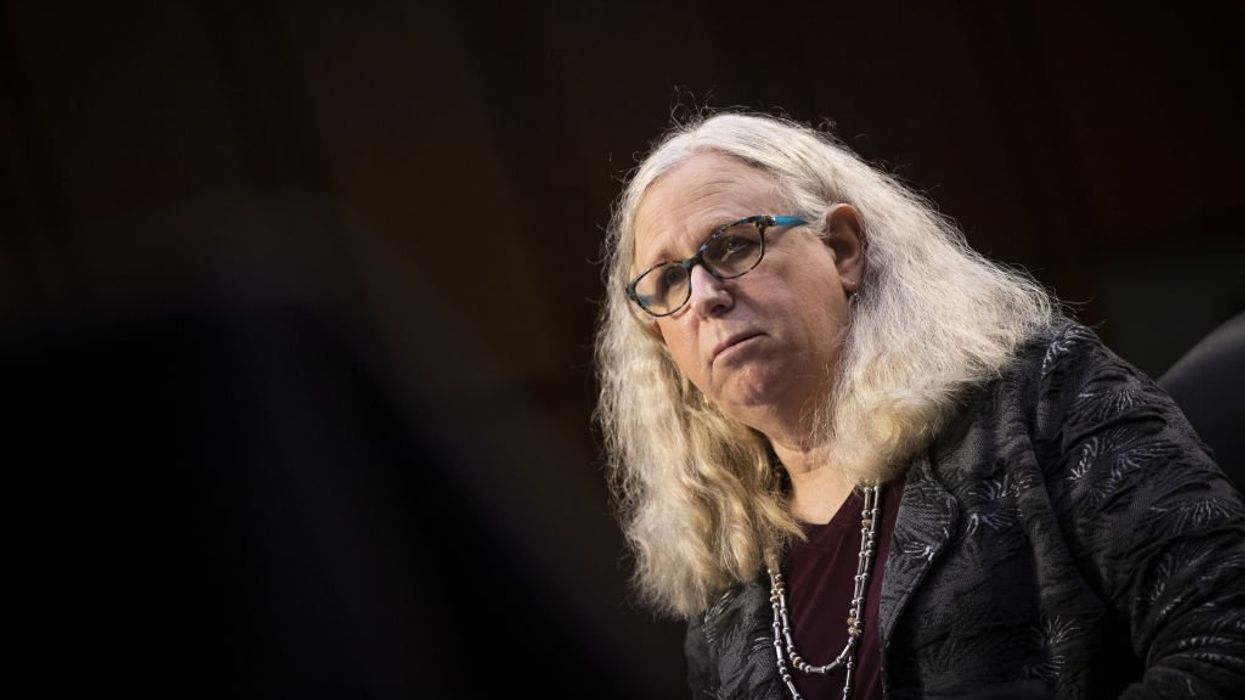GLENN: Rising from the ashes of the Democratic Republican Party in 1830. Yeah, the name. They were together at one time. Vastly different than they are now.
However, the Democratic Party, now by itself, is by any account unrecognizable from the party at its founding in 1830.
Martin Van Buren built the party around the principles of Thomas Jefferson, intending to follow current president and war hero Andrew Jackson. So let's cross the threshold of truth here first.
The Democratic Party was pro-slavery, period. Democrats can say whatever they want about the G.O.P. today, but the fact is, the Democrats were the ones who were pro-slavery, and the Republican Party was instituted to stop slavery.
On the other hand, the early Democrats wanted to emulate Thomas Jefferson. Jefferson and the early party leaders viewed the central government as an enemy of liberty, which is, oh, I don't know, going in the other direction from the Democratic Party today.
They actually believed that government intervention in the economy benefited special interest groups. Thus, it was to be avoided at all costs.
Now, imagine a Democratic Party that actually feared the concentration of power in Washington. A Democratic Party that wanted to restore the liberty of the individual, that wanted to end federal support of banks and corporations.
In other words, the Democratic Party wanted government out of the lives of people and out of the economy.
I don't even know what that looks like. But it certainly doesn't have Chuck Schumer hanging around. This was a party that disliked the public education reform programs because they feared public schools would interfere with parental responsibility and undermine freedom of religion by replacing church schools with public schools.
It is really hard to imagine any of that, yet that was the initial Democratic Party. The Democratic Party of today is virtually the antithesis of its 1830 founding principles. So what happens? Six words: William Jennings Bryant and Woodrow Wilson.
But we'll cover that in an upcoming episode. The Democrats of today like to ignore, even sweep under the rug, the horrible racist origins of their party. Democrats treated blacks and American natives terribly. In fact, the first official Democratic president, Andrew Jackson, immediately set the tone for what was to come.
VOICE: Jackson's administration immediately began expelling Native Americans living east of the Mississippi River. An issue that defined the new administration. After he signed the Indian removal act into law in 1830, five large tribes were rounded up and forcibly marched into territories and camps further west.
GLENN: That action, rounding up minority groups and sending them to camps would become a blight and an ugly stain on several Democratic presidencies, but there was more.
VOICE: The Democrats' ambitions didn't stop there. In the 1840s, the party adopted the doctrine of Manifest Destiny, the idea that Americans, white Americans, were divinely entitled to dominate the whole North American continent.
Democratic president James K. Polk put this idea into action, massively expanding US holdings by annexing Texas, acquiring Oregon, and winning much of what's now the southwestern US in a war with Mexico.
GLENN: Andrew Jackson was so dedicated to this hatred of the American native and to removing the Indians from the United States, that he even defied a US Supreme Court ruling against him and the removal.
VOICE: First major piece of legislation that he recommended and got passed was the Indian Removal Act of 1830.
VOICE: This act empowered Jackson to forcibly evict all the Indian tribes living east of the Mississippi River. Five Indian nations were directly affected.
GLENN: In the beginning, while some of the policies of the Democratic Party, if they had been put in practice, would have led to limited government, a government too small to oppress its people, but in reality, the racism at the heart of the party led to rounding up the Native American, repeatedly lying to them and forcing them from their lands.
VOICE: Instead of going on the warpath, the way their fathers and grandfathers might have done, this generation of Cherokee Indians took Georgia to court.
VOICE: The case went all the way to the United States Supreme Court. In a historic decision, chief justice John Marshall ruled in favor of the Cherokee saying they didn't have to move. But Andrew Jackson thought differently.
VOICE: Jackson sent a marshal. He made his ruling. Now let him enforce it.
VOICE: The result was that they were rounded up at gunpoint and forced to move. Their property was seized, and they were forced west, of course, on the Cherokee's forced march, about one out of every four Cherokees died en route, which is why they called it the Trail of Tears.
GLENN: Democrats also supported and continued the policy of enslaving an entire race of people, the despised Confederate flag, came from, say it with me, the Democrats. Secession, Civil War, Democrats. David Barton picks up the story in 1854, during the formation of a new party.
VOICE: In May of 1854, a number of the anti-slavery Democrats in Congress formed a new political party to fight slavery and secure equal rights for black Americans. The name of that party, they called it the Republican Party. They called it that because they wanted to return to the principles of freedom and equality, first set forth in the governing documents of the republic, before the pro-slavery members of Congress had perverted those original principles.
One of the founders of that new party was US senator Charles Sumner, who had taken the seat of the great anti-slavery senator, Daniel Webster. Sumner had a record of promoting civil rights. In fact, he championed the desegregation of public schools in Boston. Here is his argument before the state Supreme Court on that issue.
In 1856, Sumner gave a two-day long speech in the US Senate against slavery. Following that speech, Democratic representative Preston Brooks from South Carolina came from the House, across the rotunda of the capitol, and over to the Senate, where he literally clubbed down Sumner on the floor of the Senate, knocked him unconscious, and beat him almost to death. Many Democrats thought that Sumner's clubbing was deserved, and it even amused them.
It was three and a half years before Sumner recovered himself sufficiently to return to the Senate. And not surprisingly, the first speech he delivered on his return to the Senate was, again, against slavery.
GLENN: It's almost unthinkable that the Democratic assailant was never even charged with the attempted murder of a United States senator on the Senate floor.
In 1856, America would have to elect a new president.
VOICE: In 1856, the Republican Party entered its first presidential election, and that election, the Republican Party issued this, his first party platform. It was a short document. There were only nine planks in the platform, but significantly, six sent forth bold declarations of equality and civil rights for African-Americans, based on the principles of the Declaration of Independence.
The Democratic platform of that year took an opposite position, strongly defending slavery. Amazingly, according to Democrats in 1856, attempting to end slavery would ruin the happiness of the people. Despite such clear differences, the Republicans lost that election.
The next year, 1857, a Democrat-controlled Supreme Court delivered the Dred Scott decision, declaring blacks were not persons or citizens, but instead were property and therefore had no rights.
In fact, quoting from this infamous decision, Democrats on the court announced that blacks had no rights, which the white man was bound to respect and the Negro might justly and lawfully be reduced to slavery for his benefit.
GLENN: In the historic election of 1860, the Democratic Party continued its proud support of slavery.
VOICE: In the 1860 presidential election, Republican Abraham Lincoln ran against Democrat US senator Steven Douglass of Illinois. Both parties, again, issued platforms. The Republican platform of 1860 blasted both the fugitive slave law and the Dred Scott decision and it announced its continued intent to end slavery and secure equal civil rights for black Americans.
On the other hand, the Democrats and their 1860 platform praised both the fugitive slave law and the Dred Scott decision. In fact, Democrats handed out copies of the Dred Scott decision, along with their platform, to affirm their belief that it was proper to have slavery and to hold African-Americans in bondage.
GLENN: Abraham Lincoln won the election, receiving just 40 percent of the popular vote, with almost no support in the South, but 59 percent of the electoral college vote. By the time he took the oath of office, seven Southern states had already seceded from the Union, and the stage was set for the darkest period in American history.
Next time, we explore the Democratic Party following the Civil War, through the formation of the Klan. And on to Woodrow Wilson.
VOICE: Tomorrow on the Glenn Beck Program, in chapter two of the history of the Democratic Party, you'll learn about the racist roots of the party. Listen live or online at GlennBeck.com/serials.








